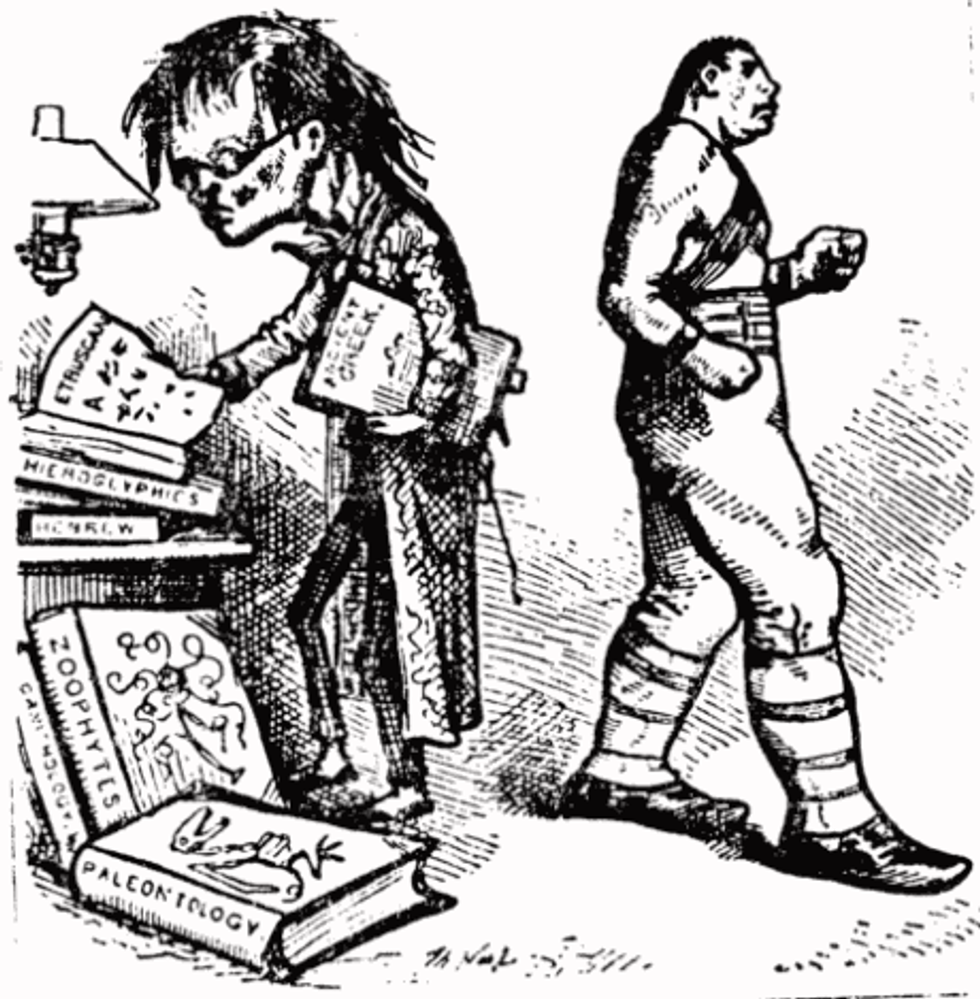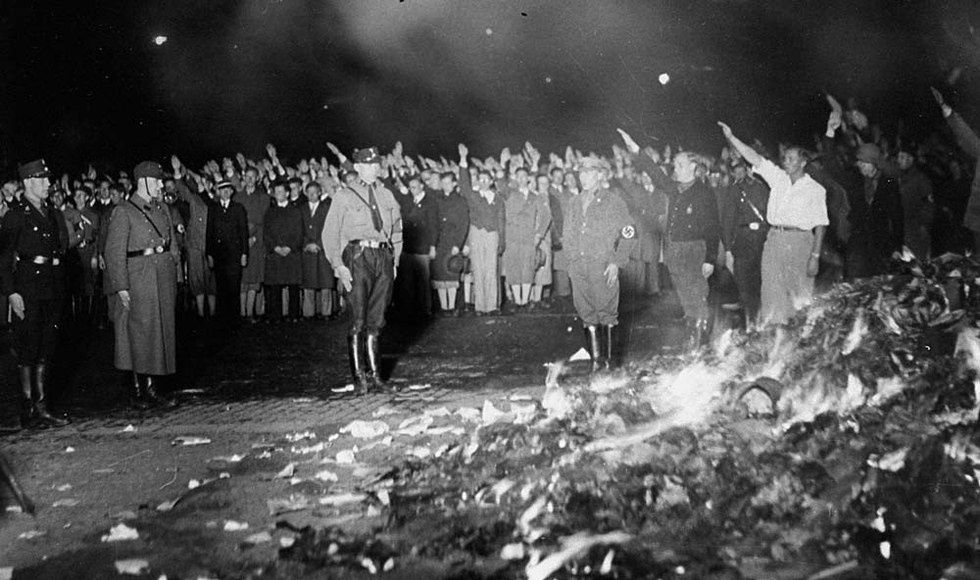Everyone’s been talking about this presidential election, and you can’t blame them; many people are starting to agree that this election has been one of a kind. But let’s turn the clock back sixteen years, to Gore v. Bush – another race that many pundits believe will go down in history.
Al Gore was a Harvard graduate (with honors!). He significantly contributed in commercializing the Internet, was outspoken on climate change (later winning a Nobel Prize for his work) and had a variety of honors and achievements under his name, creating quite an impressive resumé. He thoroughly had George W. Bush beat in their debates, his intelligence shining through. Yet a wave of anti-intellectualism swept the nation: many people began to distrust Gore, find his rhetoric and his demeanor intimidating; the media picked up on this feeling and amplified, with some news reporters describing him as a boring "government nerd", and SNL running a variety of skits lambasting Gore and his so-called alienating idiosyncrasies. No matter how you count the votes (a controversy in and of itself), at the end of the race, out on top came George Walker Bush - often characterized as an "unintelligent, privileged frat boy" by the media, known later for many 'Bushisms', complete with twangy Texas accent. The Republican campaign was ingenious - sure, Gore may be the smarter one, but you'd love to have a beer with the nice, friendly ol' Governor Bush; Gore was cold and distant by comparison. Anti-intellectualism hit America like a storm, and it cost Al Gore the presidency, and no matter how you feel about Bush, his approval ratings at the end of his eight-year term reflect a fair amount of public dissatisfaction.
The really interesting thing, though, is that Bush isn't uneducated. He went to Yale, like his father, and did well there, too (better than John Kerry, at any rate). Many of his employees and colleagues have also attested to his remarkable intellect; no matter what Bush or his campaign machine may have made him out to be, he's quite intelligent, and should never have been "misunderestimated". This wasn't exactly a secret, either - the general public didn't think Bush was a complete buffoon. The real difference was in the perception of both Bush and Gore.
Anti-intellectualism was in America well before 2000. Modern scholars trace the strain back to 19th century pop culture (well before the Kardashians, yet still rife with drama and intrigue), where many Americans were frontiersmen, farmers, and laborers and generally viewed educated people as being "book-smart, not life-smart", "scheming", and "impractical". It wasn't that Americans wanted an idiot to lead them; culturally, the ideal American was one whose aggregate knowledge was derivative of their empirical observations and labor, not from books, a refined education, and academic study. The latter were called "intellectuals," and the former, "real Americans." Reverend Bayard Hall of Indiana wrote in 1843, "We always preferred an ignorant bad man to a talented one... smartness and wickedness were generally coupled [by the people]... and incompetence and goodness [were likewise coupled]". The educated people were the ones who would rob you under your nose, the ones who'd sweet-talk the public using verbose speeches and waving around a curriculum vitae. The coupling Reverend Hall mentioned continues to exist in our stereotypes of "nerd" and "jock", and this political cartoon by Thomas Nast speaks pages to these societal views, with the flimsy, but big-headed intellectual, and the ogre-ish, tiny-headed non-intellectual:
Anti-intellectualism died down a little during the American Civil War and afterwards, since a man who broke many stereotypes about intellectual and anti-intellectual came to power: Abraham Lincoln. Coming from the backwoods of Kentucky, a large, gangly man with equal knacks of chopping wood and reading books by a fireside. After Lincoln's presidency, there seemed to be some sort of reconciliation as far as the "ideal educated American" image went, but this went down the drain when the Great Depression hit.
Herbert Hoover was one of the most educated presidents we had had yet, with a M.S. from Stanford in commerce (Fun fact: Hoover was in the first graduating class ever at the University). Yet the timing could not have been worse when the Depression hit, and many, many Americans blamed Hoover for it, going so far as to call the slums that arose "Hoovervilles". Even today, Herbert Hoover finds himself in the bottom 10 of presidents when official rankings come by. Disgruntled Americans were shocked that a president who ran a campaign professing his ability as a scholar had no brains when it came to dealing with an economic downturn, and anti-intellectualism returned with a vengeance.
The Cold War only exacerbated the distrust of educated figures of authorities, as the government began to steadily equate bookish education with communism, America's Public Enemy Number One then (and maybe now, too?). Richard Nixon was known for propagating this view, calling his particularly educated opponents "eggheads" and "soft on communists", saying this about Democrat Adlai Stevenson: ""Adlai the Appeaser . . . got a Ph.D. from Dean Acheson's College of Cowardly Communist Containment." Despite its brilliant alliteration, statements like these continued to deliver blows into public perception of intellectuals. As the Cold War began to die down, anti-intellectualism didn't: Ronald Reagan mocked Jimmy Carter during the 1980 race for being a "nerd", for example.
Even after the Bush presidency, President Obama faced a lot of opposition being directed towards the fact that he was a professor of law. Many believed that he lacked the "street know-how" to deal with foreign policy and other key presidential responsibilities. Perhaps as a backlash of the ill-received Bush administration, Obama found himself elected, yet his intellect and formal education were still used to make low blows towards him and even his wife, who's also painted as overtly educated and not a "proper" first lady (sexism intersecting with anti-intellectualism here).
Which brings us to today. The ongoing 2016 presidential election, too, has been struck by strong anti-intellectualism, though it's often hiding behind its cousin, anti-establishmentarianism. Career politicians have been analogized to scheming higher-ups and intellectuals, constantly stepping on the average Joe for their own gain and the gain of big business. And though this may be true with some politicians, no stereotype can encompass a population; many politicians have been in Congress for much of their life and continue to try and help the common American. Nevertheless, the presidential race (as of June 2016) is left with three candidates: a career politician, an anti-establishment politician, and a man with virtually no political experience. And though these three candidates have all been well-educated from a formal perspective, it's hard to argue that Mr. Trump's supporters like him for that. Instead, they have been quoted as appreciating his "polticial incorrectness", his "American work-ethic", and the fact that he "doesn't know politics." The last point - that he doesn't know politics - is yet another seed of anti-intellectualism, where many Americans seem to be drawn to a candidate like Trump because he lacks the formal record that shows he is well-equipped for politics. This has often been criticized: President Obama, in a recent Rutgers commencement address, commented on how "we want to know if our doctor has a medical degree... but when it comes to [politics], we want someone who hasn't done it before."
Anti-intellectualism is NOT good for the United States of America. To argue why would require another article, but history provides many examples of the dark paths anti-intellectualism can take us. Perhaps the most symbolic, concentrated, and real form of anti-intellectualism can be seen in the totalitarian states of the early 20th century: systematic book burning in Nazi Germany, the execution of teachers and scholars in Mao's China, and the frequent stoppage and censorship of information in the Soviet Union.
This image evokes a striking image of the destruction caused by anti-intellectualism: the prevention of knowledge dissemination, and a Dark Ages-esque rule of keeping the public uneducated and thereby enslaved:
When it comes to the 2016 election, we all have our reasons for voting one way or another. I don't mean to support or take down any candidate; I've simply noticed that one in particular seems to be gaining support rooted in anti-intellectualism, so I plead. I plead that whatever decision you make - whoever you choose to support in this race - don't let it stem from the anti-intellectualism that threatens to prevent the continued prosperity of our great country.























